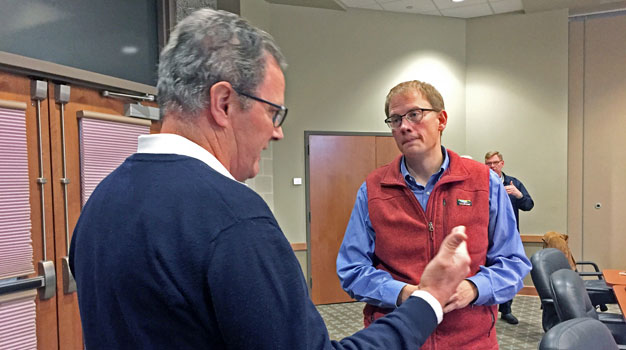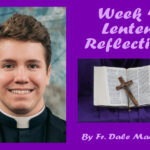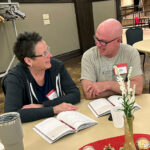
St. Ambrose University Professor Micah Kiel, right, listens to Pierre Goyot as he makes a point at Social Action Saturday during the Oct. 26 program in the university’s Rogalski Center, Davenport.
By Barb Arland-Fye
The Catholic Messenger
DAVENPORT — In separate talks, two theologians from St. Ambrose University connected their audience at Social Action Saturday to the day’s theme: Pray, Learn and Act: An Approach to Social Action.
Ella Johnson, an assistant professor of theology, focused her talk on prayer and social action. Micah Kiel, professor of theology, unpacked the message conveyed in his new book, “Reading the Bible in the Age of Francis.” Both talks encouraged participants to think more deeply about the intersection of prayer, scripture and action in responding to the call of the Gospel.
The Diocese of Davenport’s Social Action Office organized the program, held Oct. 26 at St. Ambrose University’s Rogalski Center.
After sharing a bit about her background and family, which includes a 4-year-old daughter celebrating her birthday that day, Johnson told a story about prayer through the mindset of a grieving mother.
The work of prayer
Telemachus Orfanos survived the Route 91 Harvest music festival shooting in Las Vegas in 2017 but died a year later in the mass shooting in Thousand Oaks, Calif. In a televised statement, his sobbing mother, Susan Schmidt-Orfanos said, “I don’t want prayers. I don’t want thoughts… I hope to God nobody else sends me any more prayers.”
Johnson intentionally left out part of the quote. Schmidt-Orfanos also said, “I want gun control!” In the mind of the grieving mother, “thoughts and prayers” were not enough. Action needed to follow. Johnson believes that intentional, steadfast prayer, particularly in the context of worship, does lead to action.
“I’ve been a Catholic all of my life,” Johnson said, and “we have this sort of tension out there between prayer and action.” She reflected on how Jesus always moved back and forth between worship and action. “Prayer causes us to go out and fight against war, poverty … true worship cannot be divorced from action.”
Her students, she said, wonder what they can do about issues such as climate change. While individual actions, such as taking shorter showers and conserving energy demonstrate empathy, “something bigger needs to happen,” she said. Solidarity through prayer and action, binds together the members of the human family. Prayer is the source for the hope that sustains people to do the work of social justice, she observed.
St. Ambrose University President Sister Joan Lescinski, CSJ, asked Johnson for her suggestions of people in today’s world that “we could look to, to take courage from” in the work of social justice. Johnson identified Pope Francis, ordinary people, such as Students Against Sweatshops, and Nobel Laureate Leymeh Gbowee, who gave the keynote address at St. Ambrose University’s Women for Social Justice Conference this year.
Kent Ferris, diocesan director of Social Action, suggested Bishop Thomas Zinkula as another example for his advocacy on behalf of legislation to benefit people on the margins.
The Bible and justice
Kiel began his talk with a question, “What are some of the large justice issues you and people in your parishes are talking about?”
The audience identified migration, abortion, climate change, poverty, income inequality, affordable housing, restorative justice, health care and the death penalty, among other issues. Many people see those issues as politically polarizing. The U.S. Conference of Catholic Bishops (USCCB) takes a different approach, addressing issues based on their threat to human dignity, Kiel observed.
The Bible would appear to be a clear advocate on some social justice issues, such as the treatment of migrants. But on other issues, it does not. The Book of Genesis, for example, does not call for human beings to care for creation, but to subdue it. To find the call to care for creation in scripture, “we have a little more work to do,” Kiel said.
The treatment of women in Scripture is also problematic. Women are viewed as a reflection of man and only men are made in the image of God, “according to our dear brother Paul,” Kiel said. “Jesus surrounded himself with women,” participant Amy Kersten said. “Even with Paul, it’s a complicated picture,” Kiel responded. “The Bible is a help, but also potentially a hindrance as we think about justice issues.”
Frame of reference is essential. People reading the Bible need to understand the context in which it was written, the time in which it was written, the different types of literature employed, and the audience. “Principle supersedes culture,” participant Deacon Steve Barton said. Kiel agreed, stating that Catholic Tradition has its basis in scripture and Tradition, the teachings handed down from the apostles.
God clearly is on the side of the poor and the oppressed in Scripture. In the Magnificat, Mary proclaims the greatness of the Lord who has cast down the mighty from their throne and lifted up the lowly. God turns political and socio-economic structures upside down, Kiel said.
Catholic Social Teaching
Relating this message to the present time, Kiel notes that Pope Francis wants to get to the root causes of society’s challenges, such as climate change. “He doesn’t say, ‘Drive a Prius.’ He’s saying, ‘Why is it that everyone has to drive to work?”
Kiel’s parish, St. John Vianney in Bettendorf, has developed a relationship with a parish in Haiti. “People come back (from mission trips) with new insight into what salvation means,” Kiel said. Pope Francis says “we have to go to the peripheries so the poor can evangelize us.”
Going to the peripheries doesn’t require a trip out of the country. Kiel volunteers once a week at Café on Vine, a meal site in central Davenport. The experience “changes how you think about the world and how you think about God,” he said.
Catholic Social Teaching is “built on a commitment to the poor,” according to the USCCB, and is “based on and inseparable from our understanding of human life and human dignity.” Catholic Social Teaching is the best kept secret, Kiel surmises, because “we no longer see ourselves as Christians but as Americans. We filter our experiences and beliefs through the lens of two polarized and political parties.”
Both of the Social Action Saturday talks ultimately touched on the two feet of charity and justice, a concept the late Msgr. Marvin Mottet developed as the first director of Social Action in the Diocese of Davenport. People’s immediate needs must be met; that’s charity. Justice addresses the root causes of those needs.
Addressing local needs, such as the lack of affordable housing, through the lens of two feet of charity and justice avoids the pitfalls of polarization. “Start in your local community,” urged Kent Ferris, current director of the Social Action office. “Have conversations with your parishioners.”
Glenn Leach, a volunteer in the Social Action office, said Johnson and Kiel’s talks inspired him. He appreciates the quality of the theology department at St. Ambrose University and its ability to “educate and inspire lay folks like me.”











